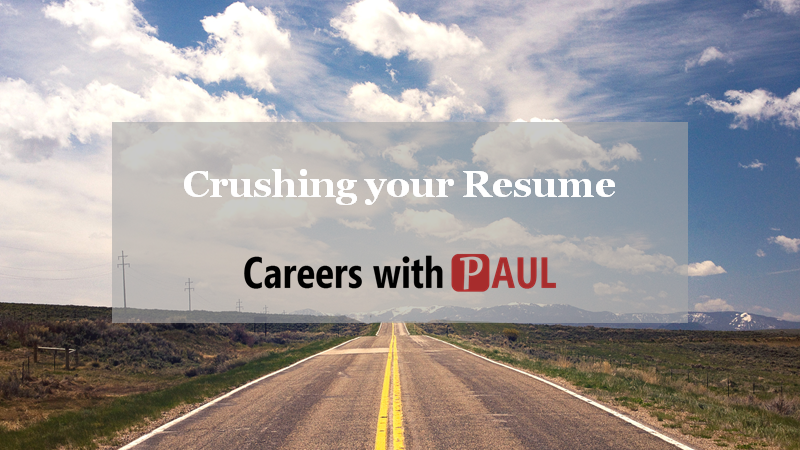
1/ Meant to get around to a review of @AliAbdaal's course which I took in November. I know it was the first cohort so I'm sure the next iteration will be even better. 
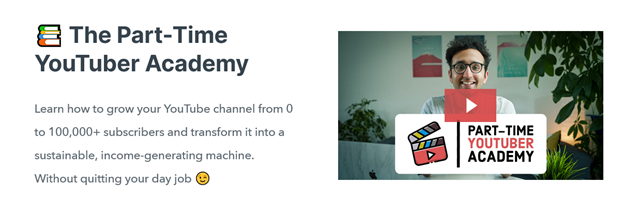
2/ Funny enough I found out about Ali an hour before him and his brother interviewed me for Not Overthinking. I had been chatting with @taimurabdaal for a while but when I googled and was like "wtf almost 1M YouTube subscribers?" who is this dude.
3/ Anyway on to the course. I signed up because my StrategyU YouTube channel blew up in 2020 going from 500 subscribers to ~9,000 but the time of this tweet. I made about $2,000 but honestly had no idea what I was doing.
4/ My goals were:
1. potentially meet friends
2. level up my technical skills
3. experience another cohort-based course (I've ran three different ones, six cohorts but havent done many myself)
4. Learn some more skills so i can others
1. potentially meet friends
2. level up my technical skills
3. experience another cohort-based course (I've ran three different ones, six cohorts but havent done many myself)
4. Learn some more skills so i can others
5/ The course had a very well structured curriculum and covered way more than I expected, including marketing, idea generation, note taking.
The course was packed with content with 3 calls a week plus many high-quality guest lectures
The course was packed with content with 3 calls a week plus many high-quality guest lectures
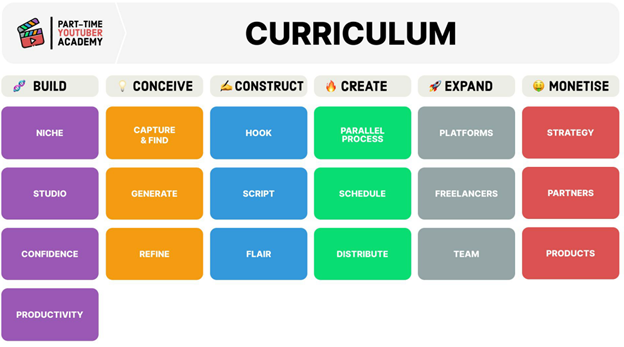
6/ The best part of the course was the homework for me. It gave me a structured way to create something beyond my comfort zone, get feedback and then keep iterating week by week. I was pretty happy with the improvements. 

7/ I had seven reflections which are probably a little more relevant to me (I've been creating online for five years, am intrigued by YouTube but dont think I want to focus on it, and have a lot of reps of creating on many mediums)
8/ #1 The financial commitment of a course really help me focus. The first cohort was a bit cheaper and I likely wouldn't have purchased if it was more than $500 but for me even a small amount can nudge and help focus my attention towards things I want to learn.
9/ #2 Friends. I met a bunch of people in the course and made several acquaintances but probably didn't do my best making the most of it. I should have tried to find a "buddy" to get feedback from earlier in the course.
10/ #3 Inspiration: I am always amazed at how many different things people are curious about. It is still very early in the "new economy" and people just don't think of others as competitors. I was inspired to see many new business ideas, ways of using content & more.
11/ #4 Tech Skills. This was the big improvement for me. I made dramatic improvements in filming, audio, lighting, editing, covers, titles, blurred background, background audio, cuts, use of b-roll and more.
This is exciting most of all because I can help others with these now
This is exciting most of all because I can help others with these now
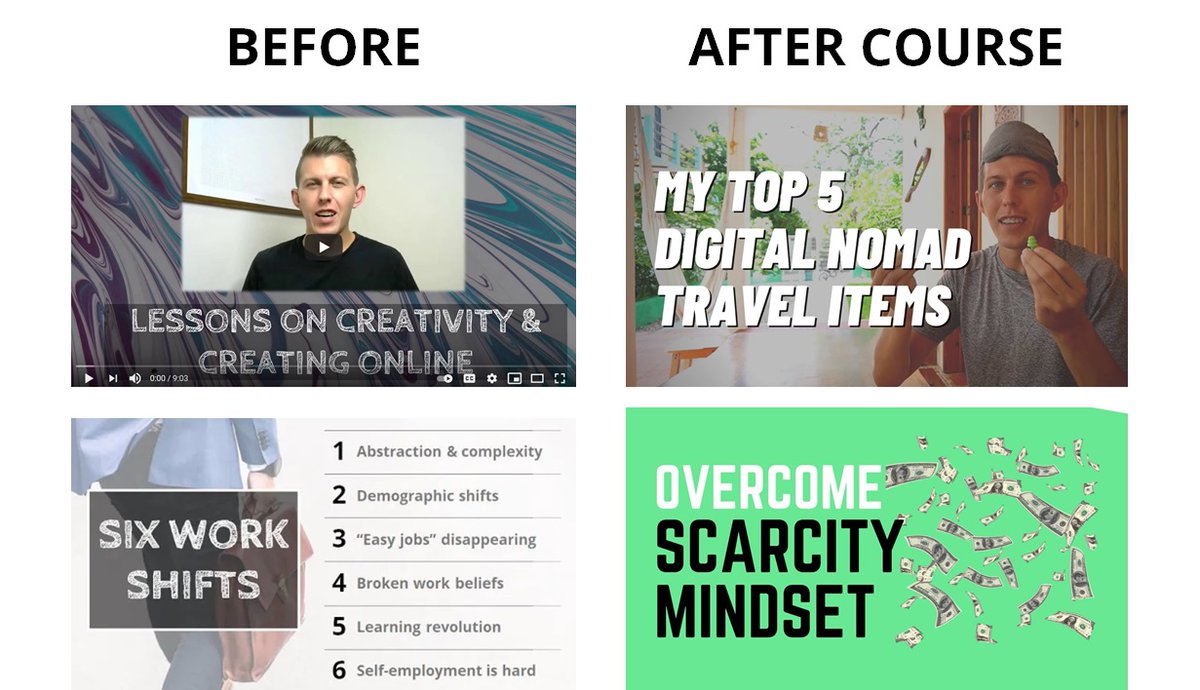
12/ #5 The feedback from the course was kick-ass. The highlight was not Ali's feedback but Angus Parker who does all the magic behind the scenes gave me some killer feedback early on. Also @lizfilips and @CharlotCrowther were amazing! 
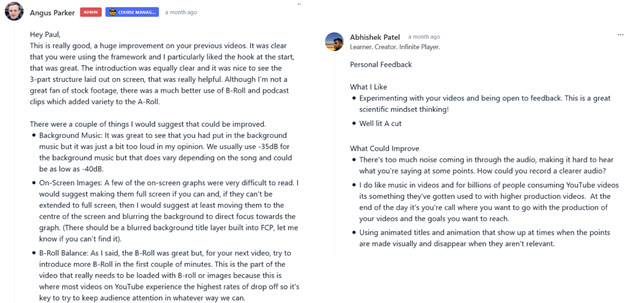
13/ #6 Actionable next steps - the combo of weekly homework and extremely pragmatic lectures (do this, then this) enabled me to try out probably 30-50 things that I didn't know how to do or didn't think about them correctly
14/ #7 Ali, Himself - Ali is a fascinating human. He manages to be down to earth, approachable and insanely productive and successful. He never tries to sell a "grow to 1M subs" approach but was honest and transparent about why hes succeeded and what you need to do for the same
15/ I'm amazed at what kind of skills Ali has learned just in his YouTube journey. He seems to have picked up 75% of an MBA on his own. This is why creating online is still an underrated thing to do even if you don't get paid.
16/ Overall best parts for me: tech skills, confidence boost, more generative ideas for future & people to go to to ask questions
I think the biggest thing they could do better is push more on the buddy system and getting people good partners (I didn't do my part on this)
I think the biggest thing they could do better is push more on the buddy system and getting people good partners (I didn't do my part on this)
17/ This course was a great experience but it made me more confident that focusing on YouTube was not something I wanted to prioritize for 2021.
For me I rather write for 10 hours than 10 hours of video editing and the feedback & connection is not as lively on YouTube
For me I rather write for 10 hours than 10 hours of video editing and the feedback & connection is not as lively on YouTube
18/ I think the ideal student for this course is:
- already creating online
- has a lot of ideas emerging already
- has some proof that their ideas connect with others
- has a lot of friction creating because of technical & confidence issues
- already creating online
- has a lot of ideas emerging already
- has some proof that their ideas connect with others
- has a lot of friction creating because of technical & confidence issues
19/ I wrote a more detailed writeup on my site including some reflections on what I think happened with online learning in 2020 (I think it took a metaphorical leap)
think-boundless.com/aliabdaalcours…
think-boundless.com/aliabdaalcours…
20/ I do have an affiliate link I'm happy to share over DM if you want but I don't really care if I get any % - just think Ali is doing some great stuff
• • •
Missing some Tweet in this thread? You can try to
force a refresh





